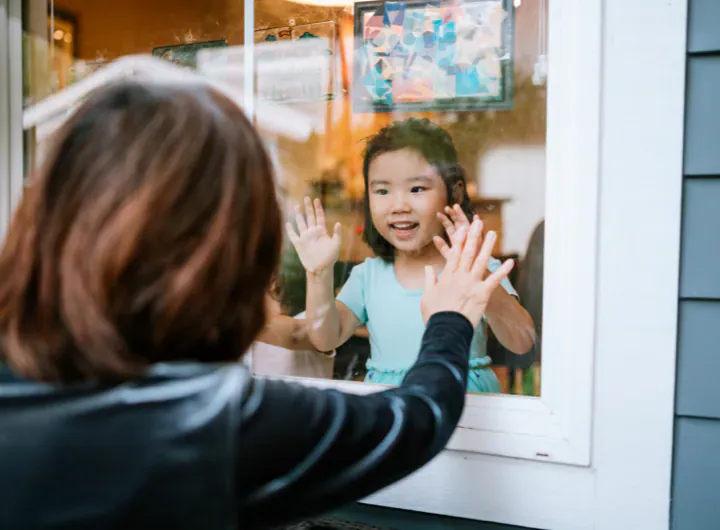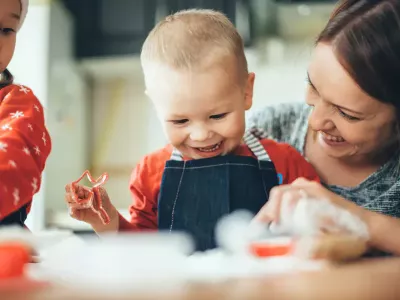REALISTIC EXPECTATIONS CAN MAKE SPECIAL OCCASIONS MORE ENJOYABLE

Sometimes reality doesn’t live up to expectations. For example, a young child can become so frustrated that they can’t kick a ball or do a handstand (even though their older sibling can), that they give up altogether. A school child whose craft project ends up with an accidental random splodge of paint on it may become distressed and say ‘the whole thing’s ruined’. A teenager with a couple of blemishes may not want to leave the house.
While these reactions are developmentally normal, to some degree, they also offer a chance for children to learn to manage their emotions and cope with disappointment. Children also learn about the importance of building up skills over time, and not giving up too easily.
In this way, children learn that expecting things to go perfectly every time is an unrealistic expectation that can stand in the way of progress.
In a similar way, sometimes when kids are looking forward to a special event, they may want it to be perfect. Even if something minor goes wrong, they can become very upset.
Of course, it’s normal to have emotions such as disappointment when something doesn’t go how you think it would. But having unrealistic expectations of ourselves and others about upcoming events can lead to anger and harsh self-criticism.
STRESSING OVER ‘THE PERFECT EVENT’?
Children learn a lot by observation. So, it helps if they see adults around them handling less-than-perfect situations without losing their cool. That may be something that also takes practice on the adult’s part.
At this time of year, people want to be happy and show their love to family members. Sometimes, that means people can put too much pressure on themselves and others, trying to create ‘the perfect meal’ or find ‘the perfect gift’. No doubt, those very words will be used in advertisements this year, as they are every year!
But chasing perfection can lead to unhappiness. Things do sometimes go wrong. And this year, factors like financial stress and travel restrictions may cause plans to change. Things may be very different to how you’d normally celebrate.
When someone is striving for perfection, and it doesn’t happen, they may be angry at themselves, and say negative things. Or they may look for someone or something to blame.
REALISTIC EXPECTATIONS DOESN’T MEAN EXPECTING THE WORST
Having realistic expectations doesn’t mean being negative, or expecting things to be bad. It just means understanding that while we can try our best, sometimes things won’t go quite to plan.
Whether it’s a burnt meal, forgetting to bring something, or running late, the big question is, is there another way to react?? For example, if one of these things happens, a person might think: “What a disaster! I should have known I’d mess it up. Everyone’s going to be upset now.” These thoughts will often result in negative emotions.
But another possible reaction would be to think: “Well, this bit didn’t go to plan, but everything else seems okay,” or “Everyone makes mistakes. I’ll just focus on what’s important – spending time together.” Thoughts like these are more likely to lead to feeling more calm, contented, and able to enjoy an event, even if it’s not perfect.
And, quite often, the imperfect moments are the ones you reminisce about for years to come!
SIMPLE FAMILY ACTIVITIES AND TRADITIONS CAN HELP KEEP THE FOCUS WHERE IT BELONGS
You can also support children’s emotional and social development by helping them find ways to express kindness to others. Taking some time each year to make some simple gifts or cards, for example, can be a way to develop greater understanding that little things count, especially if there’s genuine effort and care involved. So, what if there’s a random splodge of paint? The recipient won’t mind, because the ‘ideal Christmas’ (or birthday, or other event) is something that only exists in movies!
In this way, your family’s unique family traditions and low-key fun moments where you just enjoy each other’s company, can make this less of a time for unrealistic pressures, and more about concentrating on what’s important. You can demonstrate to children that it’s not about creating a picture-perfect outcome; it’s about just spending time together and being grateful and appreciative for what you have.
USING YOUR KNOWLEDGE
When you understand more about child development and behaviour, you can use positive parenting within your own family. You can do this in a way that will work best for you. It works at any time of year, not just right now.
Positive skills and ideas like these make it easier to cope with change and uncertainty. They also help you feel confident you’re supporting your child. You’re also taking important steps to promote their resilience and emotional wellbeing.
To learn more about child development and how you, as a parent, can use positive parenting skills and strategies to support it, try a Triple P program such as Triple P Online.

